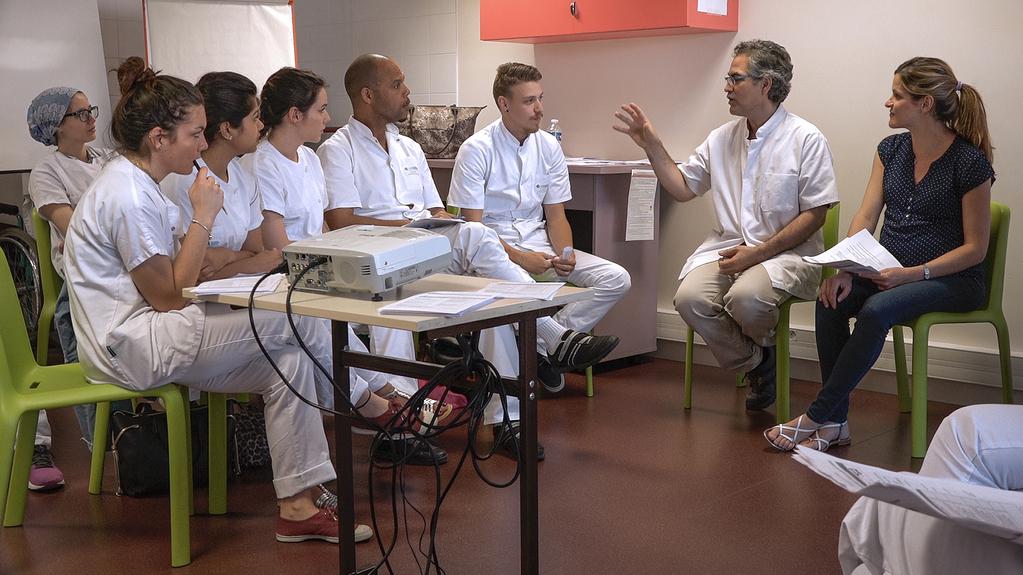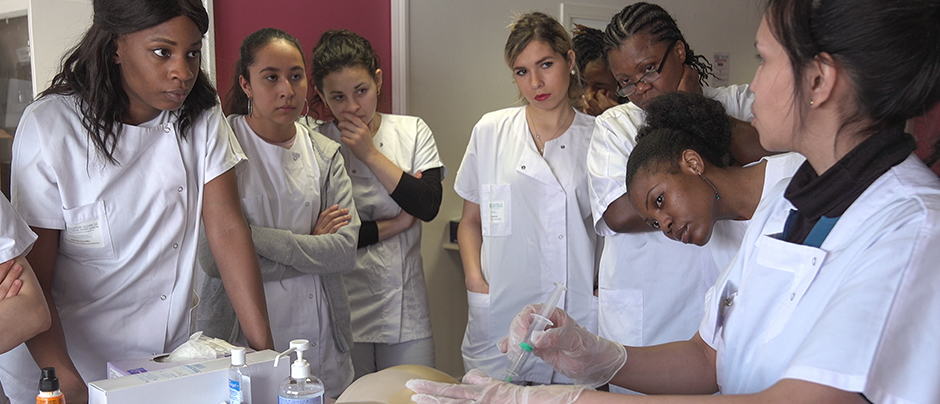Back to school is approaching and reminds us that our classes are not only in our daily lives but also in the cinema. Thus, we were able to see young people preparing for the Fémis competition in Le Concours , Kim Chapier's La Crème de la Crème evoking the crazy world of business schools or Thomas Lilti's Première Année , which comes out on September 12 and tells us about the preparation for medical competitions. But this week comes out a documentary that has not made much noise in the media: it is the film De chaque instant.
With this documentary, we infiltrate nursing schools and thus move to the other side of the hospital bed. After being patient, you are immersed in the daily life of these young people who are learning the complex profession of nursing. It is always interesting to transcribe a school career for directors who can first look at a subject that affects them and to which they are close. But in a second time, it also allows them a great deal of freedom regarding the form of their feature film. Indeed, as we have noticed, we can also tell the story of a "school" career in the form of a documentary or a fiction film. Nothing is predefined and everything is possible. This is how Nicolas Philibert chose to film the nursing training in the form of a documentary, which is not really surprising.
 A regular documentary, he was even rewarded several times for his work, notably in 2014, when he received the César for best documentary for La Maison de la radio, an immersive documentary in the premises of Radio France. Thus, one might think that Nicolas Philibert would offer us a documentary of rare quality but alas, the reality is somewhat different.
A regular documentary, he was even rewarded several times for his work, notably in 2014, when he received the César for best documentary for La Maison de la radio, an immersive documentary in the premises of Radio France. Thus, one might think that Nicolas Philibert would offer us a documentary of rare quality but alas, the reality is somewhat different.
A documentary in the image of the environment described
The medical environment is very uncluttered, very white and sometimes a little scary. Nothing exceeds, everything must be straight and the requirement is total. In an environment where a mistake can cost life, we regret the lack of color and life in this documentary. The film contains only one piece of music (which appears at the end of the film) and the outdoor shots do not seek to bring color to the film. The plans are bland and the weather gray, making the care environment more refined and almost sinister. The choice not to put a musical piece is regrettable because it would have really made this universe more endearing. Although this absence of music makes us feel more invested in the subject, it makes us feel like we are in a cold and sinister hospital room.

It is the same for the staging which does not seek to make elaborate plans but simply to show what is happening. A choice of the saddest that leads to a last part summed up by fields / counter-fields. This desire to show the action in a natural way is commendable and necessary but Nicolas Philibert chose his shots badly and could have used shoulder cameras or travellings to give movement. But here, nothing seems interesting while the theme is exciting.
Understanding the caregiver to better care
Although the film does not shine by its staging, the choice of the subject of Nicolas Philibert is very interesting and even necessary. The nursing profession may seem to us to be complex and demanding, and it is. This documentary has the merit of making people understand this profession, this field and these passionate young people who are ready to do anything to help the patient, to help the other. Despite questionable choices, the director manages to make us feel a lot of emotions in his film. He is not the only one since the few students we follow are not actors, considerably reinforcing this feeling of identification that we can have. The viewer remembers the experiences he may have had in the hospital but did not consider the role that the nurse could have. Unfairly compared to the doctor, we realize that this profession is more important than a simple needle in the arm and that it is versatile.

In addition, the film manages to be poignant with testimonies that touch and that, let us remember, are not stories told for the sake of form. And this is the strength of this documentary: the human aspect, already present in its theme but also by its characters. Obviously there are the students but there are also the teachers and especially the patients. The teachers are endearing because they are very close to their students but the patients are also interesting because they are the ones who resemble us the most. This documentary is effective because the mere sight of a patient or even a simple blood test reminds us of moments in the hospital and our empathy is multiplied.Finally, the themes addressed are obviously very important, such as the condition of the nursing profession but also death, which most students end up facing. However, this first experience can destabilize and that is why it is interesting to film because even if they are future nurses, they are above all humans. Be careful, however, not to abuse this kind of shots, at the risk of somewhat tiring the viewer.
De chaque moment is a documentary that wanted to put the human in the foreground, perhaps neglecting too much the technical aspect. And contrary to what one may imagine, the image and staging of a documentary are as important as those of a fiction film. The documentary is not a "subgenre" and how to film it is as important as the message it wants to convey. In addition, De chaque moment remains a human documentary that will appeal especially to people in the medical field. However, it may be interesting to see it. Whether out of curiosity or simply desire, anyway, you will surely learn a lot about this job.





















![Sum’One sort la pépite électro Let It Snow et le EP Hello Vera Sum'One - Let It Snow [Official Video]](https://www.justfocus.fr/wp-content/uploads/2024/11/SumOne.jpg)












